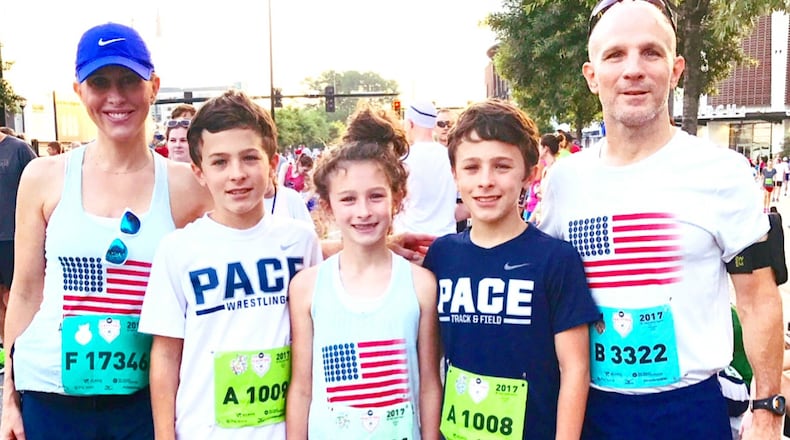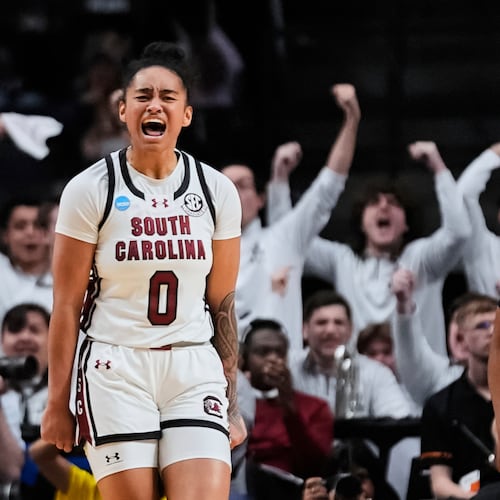When Emily Giffin talks running, she can get straight to the unvarnished truth of the matter.
Like: “I think running just hurts so much.”
But, then, there’s also the romance of the run. She can’t help herself, being both a best-selling author whose stock in trade is the human heart and part of a family that lapped the jogging stage several years back.
When Giffin talks road racing – including the signature race of them all in her adopted hometown, The Atlanta Journal-Constitution Peachtree Road Race – she might even wax enthusiastic.
Like: “It’s a pastime and it’s a sport, people can do it on all levels. The atmosphere is so positive. It’s so healthy. It’s competitive, but people are really competing with themselves, which is a rarity.
“It’s not a zero-sum game when it comes to running. It’s everyone let’s do your best, have fun, be healthy. I love that about it. There’s never a morning when you go out to either run in a race or cheer for someone running where you can be in a bad mood.”
“I feel like it’s a really positive atmosphere. We could use more of it in our society.”
Giffin was speaking last week while in the midst of a 10-city tour promoting her ninth book – “All We Ever Wanted,” in which the three protagonists find themselves (this from the promotional literature), “all questioning their closest relationships, asking who they really are, and searching for the courage to live a life of true meaning.”
No schedule would dare strand her away from home on the morning of the Fourth of July, when she, her husband Buddy Blaha and their children Harriet, Edward and George take their marks at the Peachtree Road Race. “It’s a given we’re in Atlanta every year on the Fourth of July,” she said.
The Peachtree, however, is not a join-hands-at-the-finish-line kind of event for the entire family. Not when the twin boys, 14, are thigh-deep in distance running (how many teens keep a diary of their training miles?). Not with a husband who is a regular masters competitor with the Atlanta Track Club.
And Giffin’s 11-year-old daughter just announced that this year she’d like to start up in her time group, with dad. Running a year ago with mom was just too slow.
The family that runs together sets no PRs together.
“Running is a huge part of our family life. I’m the weak link in that chain,” Giffin chuckled.
It was only last year that she ran her first Peachtree. The crew had moved to Buckhead a dozen years ago, and eventually fell into the Peachtree Road Race habit. First it was Blaha and the kids running, with Giffin cheering them on, until she finally opted for the more active option.
The experience was good enough, at least, to get her to think, yes, more of that, please. “I was shocked by the level of exhilaration I felt when I finished,” she said. “It was such an amazing sense of accomplishment. I don’t think it was a runner’s high per se – I’ve never understood what people meant by that. It was more pride.”
The duties that come with launching a new book have cut into her training time for the Fourth – and least that’s her excuse and she’s sticking to it. Thus her goal is a modest one: To not walk any of the 6.2-mile course.
Her genre is commonly referred to as “chick lit,” for its journey through the labyrinth of personal relationships. But that doesn’t define her experiences in and around athletics.
So enthralled was she by ACC basketball that before leaving Chicago for college, Giffin wrote to several programs about joining up as a manager with their men’s team. Wake Forest came through, so that’s where she went. That gave her both a great seat to one season of Tim Duncan before she moved on to law school and a healthy loathing of all things Duke. In fact, Giffin bent her story just a bit to include an unflattering passage on the Blue Devils in her first book.
Her seventh book, “The One and Only,” was set in and around a fictitious big-time college football program in Texas. For that one, she called on a well-placed friend, Syracuse basketball coach Jim Boeheim, to help explain the workings of the NCAA. He’s had his share of complications with that body.
As for running, it can serve an author in a couple of ways, Giffin figures.
It can be a great writing device, one she has employed. Eavesdropping on the inner monologue of a character who’s alone on a run can help move a story along, too.
Also, when the writer’s block strikes, pushing away from the desk and hitting the trail for a bit just might break the creative stalemate.
“You have to put in the hours to fight through the inevitable writer’s block, but I found it can be counter-productive to do too much of that,” she said. “One of the best things to do to clear your mind and spur the creativity is to go for a run, or a walk. Movement is important to the creative process.”
Only one of her books has been set in Atlanta, and in none of them has the Peachtree Road Race played a role. But regardless of where the next novels take her, the Peachtree every July 4 will likely be a central part of Giffin’s reality.
About the Author
Keep Reading
The Latest
Featured




